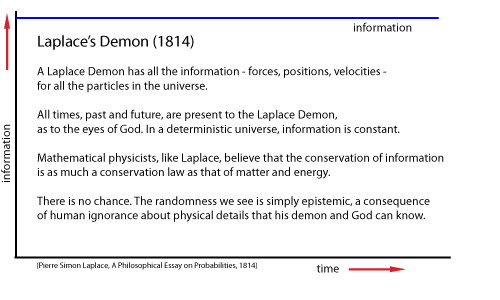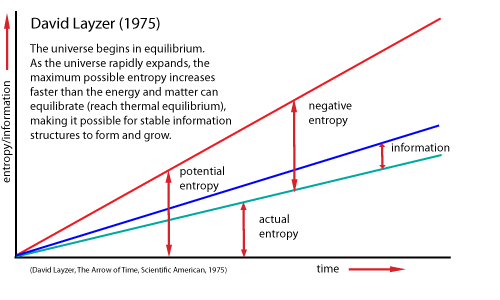# The Recurrence Problem
The idea that the macroscopic conditions in the world will repeat after some interval of time is an ancient idea, but it plays a vital role in modern physics as well.
Ancient middle eastern civilizations called it the Great Year. They calculated it as the time after which the planets would realign themselves in identical positions in the sky.
The Great Year should not be confused with the time that the precession of the equinoxes takes to return the equinoxes to the same position along the Zodiac - although this time (about 26,000 years) is of the same order of magnitude as one famous number given by Babylonian astronomers for the Great Year (36,000 years).
Many societies have the concept of the Great Year, but none did calculations as carefully as the Babylonians. But since the planets orbital periods are not really commensurate, they kept increasing the time for the Great Year in the search for a better recurrence time.
The Greek and Roman Stoics thought the Great Year was a sign of the rule of law in nature and the God of reason that lay behind nature.
### Nietsche's Eternal Return
In modern philosophy, [Friedrich Nietzsche](https://www.informationphilosopher.com/solutions/philosophers/nietzsche/) described an eternal return in his _Also Sprach Zarathustra_.
### [Zermelo](https://www.informationphilosopher.com/solutions/scientists/zermelo/)'s Paradox
Zermelo's paradox was a criticism of [Ludwig Boltzmann](https://www.informationphilosopher.com/solutions/scientists/boltzmann/)'s H-Theorem, the attempt to derive the increasing entropy required by the second law of thermodynamics from basic classical dynamics.
It was the second "paradox" attack on Boltzmann. The first was [Josef Loschmidt](https://www.informationphilosopher.com/solutions/scientists/loschmidt/)'s claim that entropy would be reduced if time were reversed. This is the [problem of microscopic reversibility](https://www.informationphilosopher.com/problems/reversibility/).
[Ernst Zermelo](https://www.informationphilosopher.com/solutions/scientists/zermelo/) was an extraordinary mathematician. He was (in 1908) the founder of [axiomatic set theory](http://en.wikipedia.org/wiki/Zermelo%E2%80%93Fraenkel_set_theory), which with the addition of the axiom of choice (also by Zermelo, in 1904) is the most common foundation of mathematics. The axiom of choice says that given any collection of sets, one can find a way to unambiguously select one object from each set, even if the number of sets is infinite.
Before this amazing work, Zermelo was a young associate of [Max Planck](https://www.informationphilosopher.com/solutions/scientists/poincare/) in Berlin, one of many German physicists who opposed the work of Boltzmann to establish the existence of atoms.
Zermelo's criticism was based on the work of [Henri Poincaré](https://www.informationphilosopher.com/solutions/scientists/poincare/), an expert in the three-body problem, which, unlike the problem of two particles, has no exact analytic solution. Where two-bodies can move in paths that may repeat exactly after a certain time, three bodies may only come arbitrarily close to an initial configuration, given enough time.
Poincaré had been able to establish limits or bounds on the possible configurations of the three bodies from conservation laws. Planck and Zermelo applied some of Poincaré's thinking to the _n_ particles in a gas. They argued that given a long enough time, the particles would return to a distribution in "phase space" (a 6_n_ dimensional space of possible velocities and positions) that would be indistinguishable from the original distribution. This is called the Poincaré "recurrence time."
Thus, they argued, Boltzmann's formula for the entropy would at some future time go back down, vitiating Boltzmann's claim that his measure of entropy always increases - as the second law of thermodynamics requires. Poincaré' described his view in 1890.
> A theorem, easy to prove, tells us that a bounded world, governed only by the laws of mechanics, will always pass through a state very close to its initial state. On the other hand, according to accepted experimental laws (if one attributes absolute validity to them, and if one is willing to press their consequences to the extreme), the universe tends toward a certain final state, from which it will never depart. In this final state, which will be a kind of death, all bodies will be at rest at the same temperature.
>
> I do not know if it has been remarked that the English kinetic theories can extricate themselves from this contradiction. The world, according to them, tends at first toward a state where it remains for a long time without apparent change; and this is consistent with experience; but it does not remain that way forever, if the theorem cited above is not violated; it merely stays there for an enormously long time, a time which is longer the more numerous are the molecules. This state will not be the final death of the universe, but a sort of slumber, from which it will awake after millions of millions of centuries.
>
> Poincaré's "little patience" would be severely tried by Boltzmann's calculation that even a small number of particles would not recur in his "millions and millions of centuries"
>
> According to this theory, to see heat pass from a cold body to a warm one, it will not be necessary to have the acute vision, the intelligence, and the dexterity of Maxwell's demon; it will suffice to have a little patience.
>
> One would like to be able to stop at this point and hope that some day the telescope will show us a world in the process of waking up, where the laws of thermodynamics are reversed.
>
> > ("On the Three-Body Problem," _Acta Mathematica_ 1890)
Boltzmann replied that his argument was statistical. He only claimed that entropy increase was overwhelmingly more probable than Zermelo's predicted decrease. Boltzmann calculated the probability of a decrease of a very small gas of only a few hundred particles and found the time needed to realize such a decrease was many orders of magnitude larger than the presumed age of the universe.
The idea that a macroscopic system can return to exactly the same physical conditions is closely related to the idea that an agent may face "[exactly the same circumstances](https://www.informationphilosopher.com/problems/recurrence/freedom/same_circumstances.html)" in making a decision. [Determinists](https://www.informationphilosopher.com/problems/recurrence/freedom/determinism.html) maintain that given the "fixed past" and the "laws of nature" that the agent would have to make exactly the same decision again.
## The Extreme Improbability of Perfect Recurrence
In a classical [deterministic](https://www.informationphilosopher.com/freedom/determinism.html) universe, such as that of [Laplace](https://www.informationphilosopher.com/solutions/scientists/laplace/), where information is constant, Zermelo's recurrence is mathematically possible. Given enough time, the universe can return to the exact circumstance of any earlier instant of time, because it contains the same amount of matter, energy, and information.

But, in the real universe, [David Layzer](https://www.informationphilosopher.com/solutions/scientists/layzer/) has argued that information (and the material content of the universe) expands from a minimum at the origin, to ever larger amounts of information. Consequently, it is statistically and realistically improbable (if not impossible) for the universe as a whole to return to exactly the same circumstance of any earlier time.

[Arthur Stanley Eddington](https://www.informationphilosopher.com/solutions/scientists/eddington/) was probably the first to see that the expanding universe provides a resolution to Zermelo's objection to Boltzmann.
> By accepting the theory of the expanding universe we are relieved of one conclusion which we had felt to be intrinsically absurd. It was argued that every possible configuration of atoms must repeat itself at some distant date. But that was on the assumption that the atoms will have only the same choice of configurations in the future that they have now. In an expanding space any particular congruence becomes more and more improbable. The expansion of the universe creates new possibilities of distribution faster than the atoms can work through them, and there is no longer any likelihood of a particular distribution being repeated. If we continue shuffling a pack of cards we are bound sometime to bring them into their standard order — but not if the conditions are that every morning one more card is added to the pack.
>
> > (_New Pathways in Science_, 1939, p.68)
[H. Dieter Zeh](https://www.informationphilosopher.com/solutions/scientists/zeh/) also sees that the age of the universe being much less than the Poincaré recurrence time may invalidate the recurrence objection.
> Another argument against the statistical interpretation of irreversibility, the recurrence objection (or _Wiederkehreinwand_), was raised much later by Ernst Friedrich Zermelo, a collaborator of Max Planck at a time when the latter still opposed atomism, and instead supported the 'energeticists', who attempted to understand energy and entropy as fundamental 'substances'. This argument is based on a mathematical theorem due to Henri Poincaré, which states that every bounded mechanical system will return as close as one wishes to its initial state within a sufficiently large time. The entropy of a closed system would therefore have to return to its former value, provided only the function _F(z)_ is continuous. This is a special case of the quasiergodic theorem which asserts that every system will corne arbitrarily close to any point on the hypersurface of fixed energy (and possibly with other fixed analytical constants of the motion) within finite time.
>
> While all these theorems are mathematically correct, the recurrence objection fails to apply to reality for quantitative reasons. The age of our Universe is much smaller than the Poincaré recurrence times even for a gas consisting of no more than a few tens of particles. Their recurrence to the vicinity of their initial states (or their coming close to any other similarly specific state) can therefore be excluded in practice. Nonetheless, some 'foundations' of irreversible thermodynamics in the literature rely on formal idealizations that would lead to _strictly infinite_ Poincaré recurrence times (for example the 'thermodynamical limit' of infinite particle number). Such assumptions are not required in our Universe of finite age, and they would _not_ invalidate the reversibility objection (or the equilibrium expectation, mentioned above). However, all foundations of irreversible behavior have to presume some very improbable initial conditions...
>
> > (_The Physical Basis for the Direction of Time_. 5th ed., 2010 p.42)
>
> In order to reverse the thermodynamical arrow of time in a bounded system, it would not therefore suffice to "go ahead and reverse all momenta" in the system itself, as ironically suggested by Boltzmann as an answer to Loschmidt. In an interacting Laplacean universe, the Poincaré cycles of its subsystems could in general only be those of the whole Universe, since their exact Hamiltonians must always depend on their time-dependent environment.
>
> >